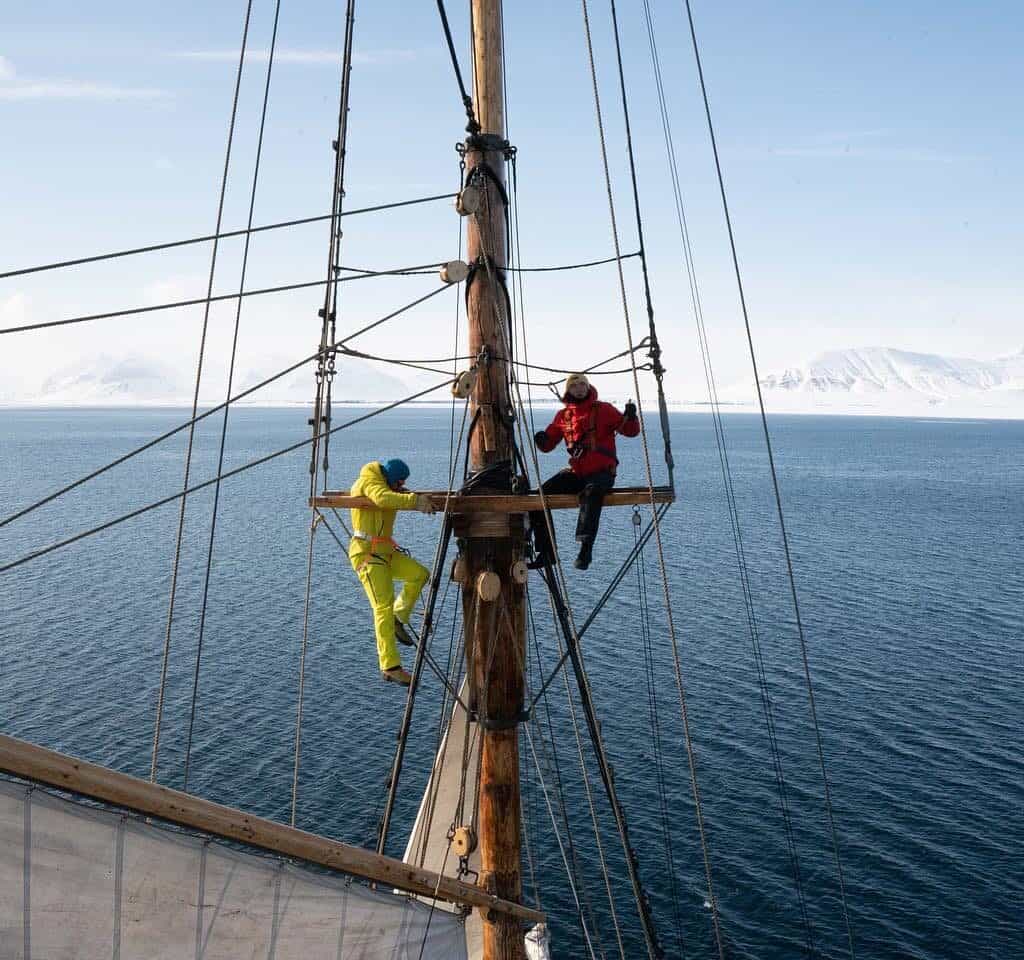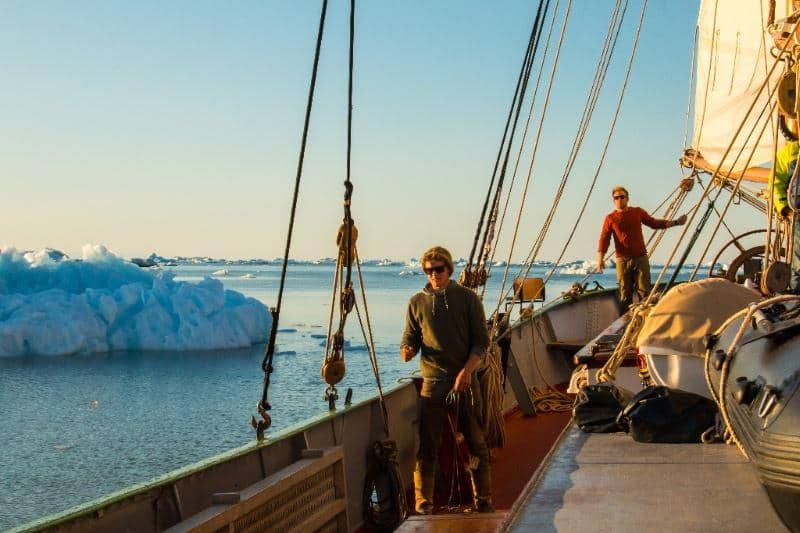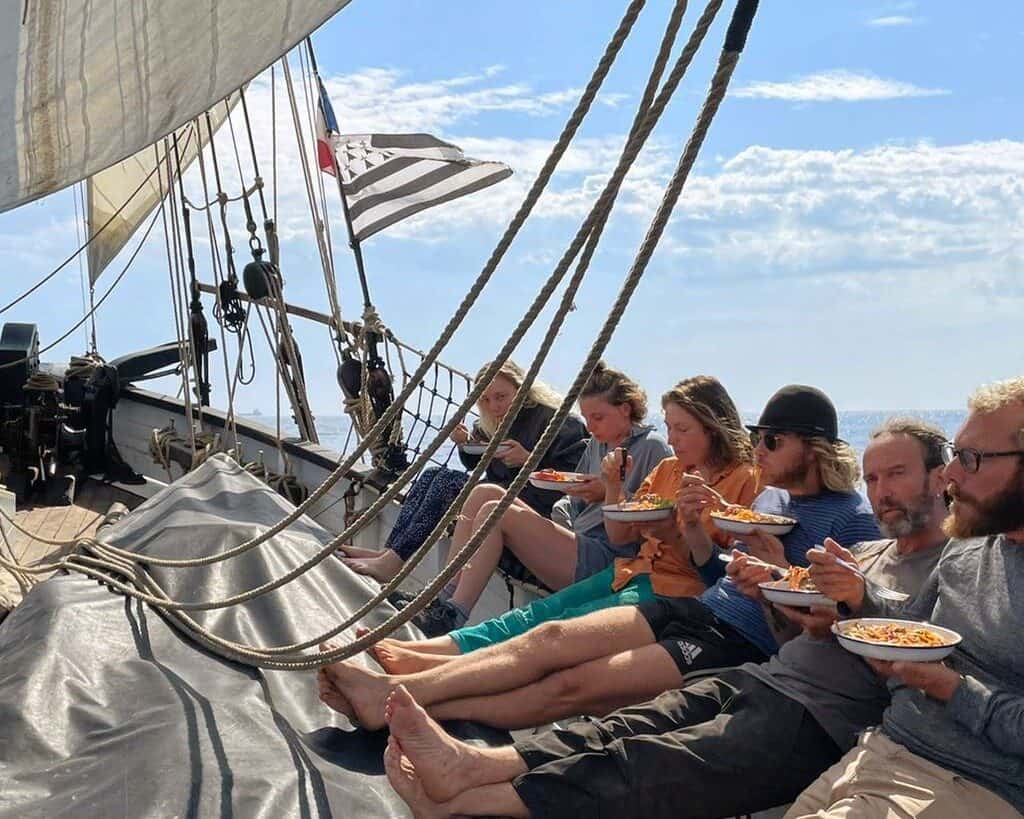Like all things in life, you get out what you put into an adventure, but sometimes you need to do your own risk assessment and honestly look at more than just your enthusiasm for seeing remote corners of the earth in a romantic way by tall ship.
If you are wondering if some of our more epic adventures are for you, then hopefully this article will help you decide.
It is worth bearing in mind that all voyages require you to complete fairly detailed health and medical questions before the ship accepts your booking (or takes payment). Sometimes this will not be as simple as the ship having a specific set of fitness requirements. So long as everyone on board can be accommodated safely, the goal is to have a good mix of ages and physical abilities. this necessitates a bit of a selection process. For example, a whole ship full of youngsters with dodgy backs or sailors with asthma wouldn’t be too smart, but one dodgy back and one asthmatic can still find plenty of useful things to do on deck as part of a mixed crew.
Ships sailing in remote areas of ocean will be stricter in their medical selection process than those operating within reach of civilisation, as medical evacuation is not an option should things go wrong. The ship must be confident that they can accommodate you safely on board, and that any flare up of a health condition can be dealt with effectively on board by the trained crew.
Will I be Physically Challenged Enough?
If you are fearless and still in your prime, then you probably can’t wait to see giant foam streaked rollers (like those in the old black and white ‘Round the Horn’ films). Naturally the Captain will be doing what they can to avoid the roughest conditions in order to keep ship and sailors safe, but don’t worry: the conditions that the ship can safely handle will feel plenty challenging enough!

My Spirit is Willing but is my Body up to it?
If, like the majority of us, you are only able to afford an epic career break just as your body starts to creak a bit, then the decision gets a bit more tentative.
So how physical is it on each ship, and how agile do you have to be to just live on the ship, move around between decks, and get ashore safely?
Every ship is different, and while we’ve provided some general advice below, if you are in any doubt then Get in Touch! We are more than happy to discuss a trip’s suitability, and help you find alternatives if necessary. Our goal is for you to have an exhilarating and satisfying adventure, and if a trip is not going to be right for you, we will discuss this with you.

Moving around the ship
Whether you are on steel or wood decks, if it is windy they will heel and dip and roll. Snow, hail, ice and sea water can make them slippery. There are many handrails and rope safety lines around shoulder height you can grab, or even clip onto. If the ship lurches or rolls then you need enough strength in your arms, shoulders, and hands to grip and hold on. Generally sailing ships only roll in an unpredictable way when the wind is dead astern. The crew therefore always try to have the wind a bit on the side so there is a more regular movement and the deck can be heeled steeply but will move in a more predictable way than a large motor vessel in the same conditions. You can quickly learn to ‘ride’ the ship and feel much more stable.
The larger ships often have split level decks, with companionways between. Learning to navigate steps safely in a rolling sea can be challenging. The best advice we can give is to take is SLOWLY and go down backwards. There are no points for style. You’ll soon get the hang of it.
On any vessel, the more she moves the more your body works to keep you upright. Even when asleep in your bunk, you may find yourself bracing and clenching in your sleep to prevent any rolling (tightening up the lee-cloth and cuddling up to your rucksack helps with this!). In this sense, big ocean sailing is more of a stamina game than a strength one. Keep eating! You’ll be amazed how much energy you need just to stand still.

Living on board
These are not cruise ships. The only stabilisers they have are the sails. There are plenty of places you can take your meals to eat – both below decks at tables and al fresco on deck. It can be lovely to be sitting on deck in the sun in a beautiful anchorage with mountains all around…..or you can be wedging yourself in to a corner on the leeward or windward side of a table below decks and hanging on to your orange juice and breakfast plate wondering if a third hand might be useful…
In sheltered waters taking a shower or going to the toilet is easy. At sea we highly recommend sitting down for both (you too, chaps).
Getting into your bunk is another consideration. If you are on a top bunk (and someone has to be) you’ll need to time your ascent with the movement of the boat – whether you’re using a just a raised edge of a lower bunk or a ladder to launch yourself from.
Even fit, young people find it tiring to live life on a ship in motion, even without taking part in the sailing!

The Sailing Duties
Ships vary in how much hands-on sail handling they require from their guest crew. Some of the smaller vessels may need your input in order to sail, whereas on others you can be as involved (or not) as you want to be. The same goes for watch keeping: you may be able to join a navigational watch if you choose, or you may be required on one. Either way you will be strongly encouraged to stand lookout duty (who would want to miss the scenery anyway), take turns on the helm and help with sailing manoeuvres.

Getting Ashore
Just when you’ve gotten used to moving around the ‘mother ship’, it’s time to jump in the dinghy and venture ashore. This can be challenging in choppy water, but the crew will help keep you safe and you should be as slow as you need to be. At no point would you be expected to climb into the dinghy if the crew didn’t think it safe to do so.
In remote locations there won’t be a handy pontoon to hitch the tender to, and beach landings can be the norm. These are a skill in themselves, and you should expect to get soggy feet at least the first few times you try (all the ships have somewhere you can dry your wet things before the next excursion!).

Medical issues
In remote places any medical evacuation will be by ship and take days. The likelihood of you seeing another vessel can be slim, but there may be other ships in the vicinity. This creates a certain level of rescue assistance…..but it could still take days for another ship to come to your aid. Otherwise, the medically trained crew may have to deal with a medical emergency with radio advice from doctors ashore.
We have to be absolutely sure that there is no medical issue likely to arise – other than the totally unexpected. This is why the medical and health questions you will be asked during your voyage application can seem so onerous. Please be as honest as possible.
What if it’s not for me?
If sailing in a remote area is not for you, you’d be surprised how adventurous even a short coastal voyage can be. We can help you pick a trip that challenges you just enough, without feeling like you’re out of your depth. And you can always pick up a copy of ‘South’ to read while you’re away, if you want a taste of the extreme!



